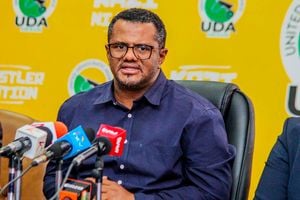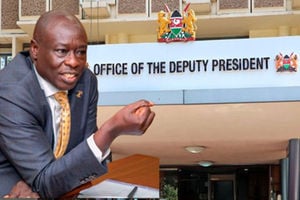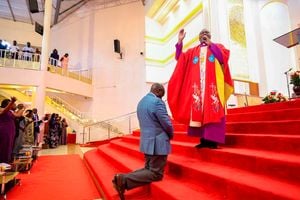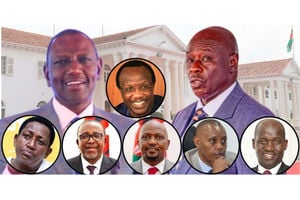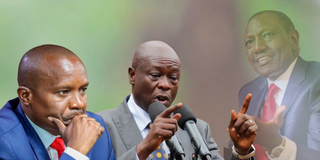
The High Court's orders preventing CS Kithure Kindiki's swearing-in following Rigathi Gachagua's impeachment have led to divided legal opinions.
Impeached Deputy President Rigathi Gachagua has trained his guns on his designated successor Kithure Kindiki saying he was ineligible for the post because he was not a member of the United Democratic Alliance (UDA) party for three months prior to his nomination.
Opposing applications by Attorney-General Dorcas Oduor and National Assembly seeking to lift an order blocking his replacement, Mr Gachagua said Prof Kindiki told Parliament on August 1, during his vetting for reappointment following the Gen Z protests that he had resigned as a member of the UDA party.
In an affidavit filed in court, Mr Gachagua said Prof Kindiki was not qualified for nomination to the elective position of deputy president under Article 137 on October 18, when the vacancy arose.
“However, his nomination as deputy president on October 18, allegedly included confirmation of membership status in a political party from the Office of the Registrar of Political Parties and political membership confirmation from the UDA,” he said.
He further said Prof Kindiki had not resigned as Interior Cabinet Secretary (CS) and was thus disqualified under Article 148.
Being a full-time State officer as a CS, he argued that Prof Kindiki was barred from participating in any other gainful employment as the deputy president.
Mr Gachagua further questioned the rush to replace him stating that whereas the Constitution prescribes 74 days to fill the post, the process was “truncated and executed in less than six hours”.
“In totality, the procedure of removing me from office, nominating my replacement and the approval thereof by the National Assembly was marred by constitutional breaches. The end result is that the entire process is unconstitutional, null and void,” he said.
His lawyer Elisha Ongoya said whereas justice delayed is justice denied, justice hurried is justice miscarried, adding that Parliament and the Executive failed to give public participation a chance.
“Clearly, we may have varying definition of the word hurry, but we can build consensus that this one was undisputedly unprecedented hurry,” Mr Ongoya.
The lawyer said the process undertaken by the Independent Electoral and Boundaries Commission (IEBC) as well as Ethics and Anti-Corruption Commission (EACC) in the communique to National Assembly, did “not have even an iota of public participation”.
He said the process between October 1 and 17, when the notice was given in the National Assembly and the resolution by the Senate, had pretenses of public participation.
“The process on October 18 was brazen as they undertook it without any pretense of public participation,” he said.
Mr Ongoya added that the process is a nullity for lack of public participation or seek memoranda on the suitability of Prof Kindiki.
He pleaded with the Judiciary to uphold the Constitution saying it was the only opportunity for “righting wrongs and not for perpetuating wrongs”.
“What this case has taught me is just how peril as we stand as a country if we depend on our legislative and executive institutions and very recently our constitutional commissions. Our remaining beacon of hope is the Judiciary. I have one question for you. Will you drop the ball or will you hold the ball?” he posed.
Mr Ongoya said the AG was calling on the judges to undo what three other judges of the High Court had established on the impeachment process.
The Senate urged the court to reject Mr Gachagua’s arguments saying he was given fair hearing as he was accorded the opportunity to file his responses and cross-examine the witnesses who appeared before the Senate.
Through lawyer Prof Tom Ojienda, senate said Mr Gachagua was present throughout the trial until the last minute, when he failed to turn up.
He said his lawyers failed to present a medical report from hospital or any document on his health status, but instead walked out of the Senate.
Prof Ojienda submitted the process was time-bound.
Dr Muthomi Thiankolu for Prof Kindiki said the High Court has no jurisdiction to determine the impeachment of the deputy president, arguing that it is preserved for the Supreme Court.
According to Dr Thiankolu there is no clause in the constitution that mandates the High Court entertain the petition as presented by Mr Gachagua.
Prof Githu Muigai for Attorney General submitted that the constitution protects everybody and not tailored for a section of the society.
“We are told continuously that the executive is the problem. The executive is also protected by law. The president has the powers to nominate a deputy president, he did that. He has the powers to send the name to Parliament, he did that. Parliament has the powers to approve the nomination, which happened,” he said that the entire process is protected by the constitution.
Prof Muigai submitted that the order issued by the High Court in Kerugoya has far-reaching implications since at the moment, there is no substantive deputy president in office, yet the constitution does not envisage a vacuum in the office.
“The Constitution does not envisage a vacuum in the office of the deputy president and as such, it is in the interest of justice that the interim orders herein be set aside or varied,” Solicitor-General Shadrack Mose said in an affidavit.
Mr Mose said the court erred in law by issuing an order that was not sought by the five petitioners in Kerugoya.

